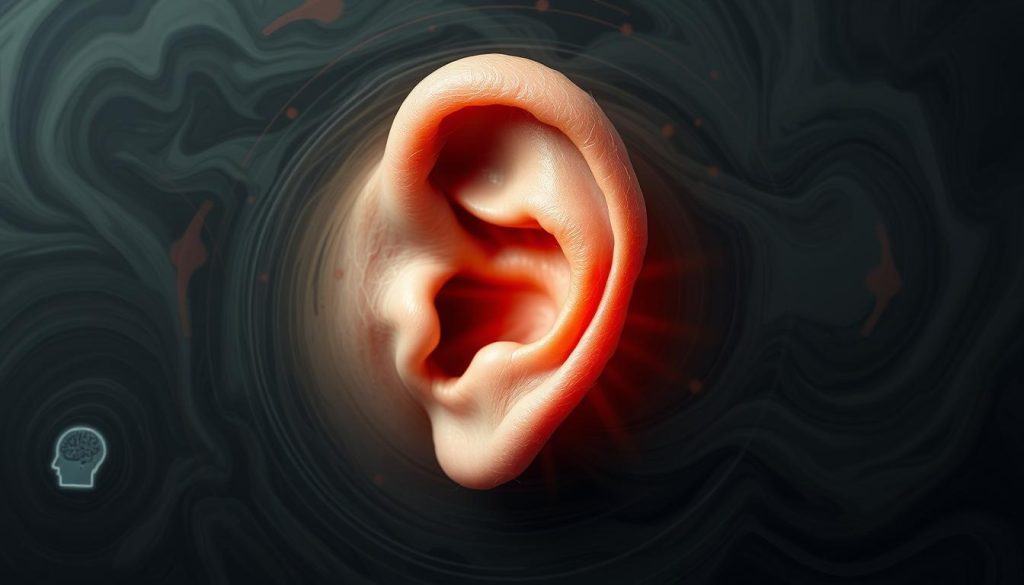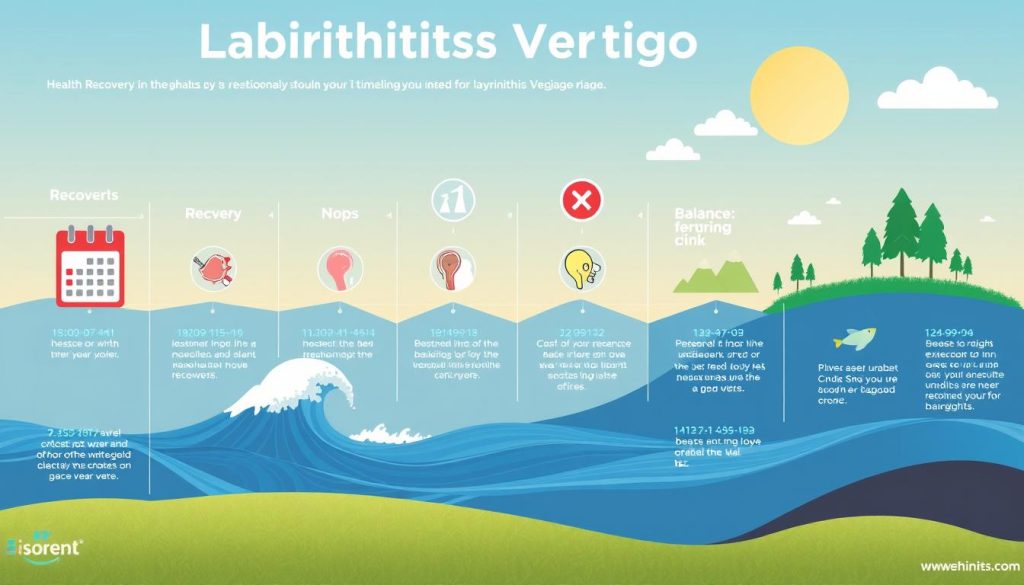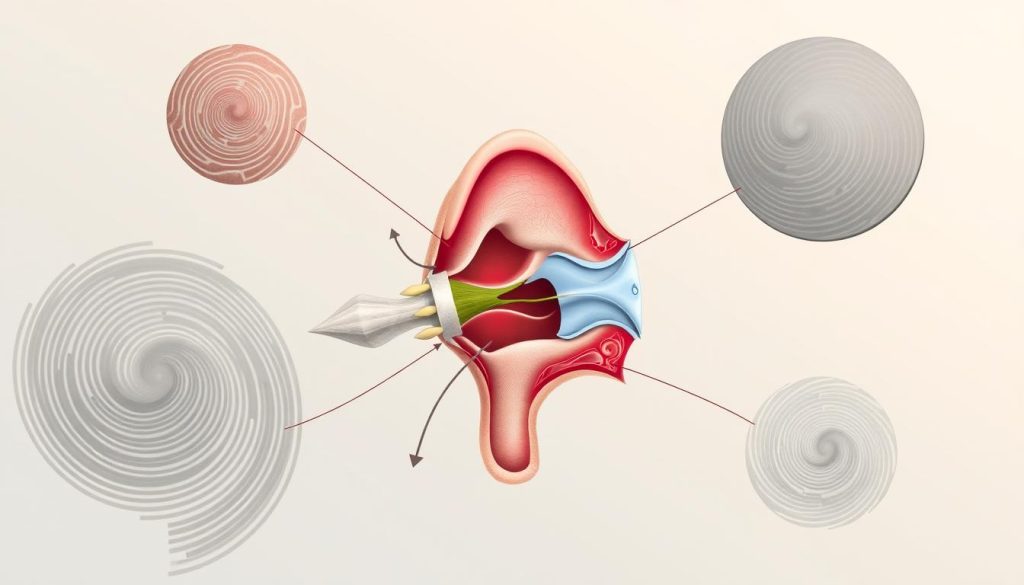Ear infections and vertigo often go hand in hand, creating a dizzying experience for many. This guide dives into the ear infection vertigo link, shedding light on how these conditions intertwine. We’ll explore the inner workings of your ear’s balance system and uncover how infections can throw it off kilter.
Understanding ear infection symptoms is crucial for early detection and treatment. From mild discomfort to severe dizziness, the effects can vary widely. We’ll break down the different types of ear infections and their potential to trigger vertigo, equipping you with the knowledge to recognize when it’s time to seek medical help.
Join us as we navigate through the causes, symptoms, and treatment options for ear infection-related vertigo. By the end, you’ll have a clearer picture of this complex relationship and how to manage it effectively.
Understanding the Connection Between Ear Infections and Vertigo
Ear infections can mess with our balance, causing vertigo. The inner ear is key to keeping us steady. When it gets infected, we might feel like we’re spinning.
The Anatomy of Inner Ear Balance System
The inner ear has special parts for balance. The semicircular canals and otolith organs track our head movements. They send signals to the brain, helping us stay balanced.
How Infections Disrupt Balance Mechanisms
Inner ear infections can make these parts swell. This swelling messes with their signals to the brain. It can make you feel like the room is spinning.
Types of Ear Infections Linked to Vertigo
Several ear infections can cause vertigo:
- Labyrinthitis: An infection of the inner ear labyrinth, causing labyrinthitis vertigo
- Vestibular neuritis: Inflammation of the vestibular nerve
- Otitis media: Middle ear infection that can spread to the inner ear
Knowing about these connections helps us understand vertigo from ear infections. If you’re always dizzy or off balance, see a doctor. They can help figure out what’s wrong and how to fix it.
Can an Ear Infection Cause Vertigo: The Direct Link
Ear infections can indeed cause vertigo, leading to a spinning sensation and balance problems. The link between ear infections and dizziness is rooted in the intricate structure of our inner ear.
When an infection occurs in the inner ear, it can disrupt the delicate balance mechanisms. This disruption often results in ear infection dizziness, affecting a person’s ability to maintain equilibrium. The vestibular system, responsible for our sense of balance, becomes compromised during an infection.
Different types of ear infections can trigger vertigo:
- Labyrinthitis: Inflammation of the inner ear’s labyrinth
- Vestibular neuritis: Infection of the vestibular nerve
- Otitis media: Middle ear infection that can spread inward
These infections can cause fluid buildup or inflammation, interfering with the normal function of balance-regulating structures. As a result, individuals may experience sudden bouts of dizziness, nausea, and difficulty maintaining balance.
“Vertigo from ear infections can be debilitating, but with proper diagnosis and treatment, most patients recover fully.”
Understanding the connection between ear infections and vertigo is crucial for prompt treatment. If you experience persistent dizziness along with ear pain or pressure, consult a healthcare professional to determine if an ear infection is the underlying cause.
| Ear Infection Type | Location | Vertigo Likelihood |
|---|---|---|
| Labyrinthitis | Inner Ear | High |
| Vestibular Neuritis | Vestibular Nerve | High |
| Otitis Media | Middle Ear | Moderate |
Common Symptoms of Ear Infection-Related Vertigo
Ear infections can cause a range of symptoms, from mild to severe. When an ear infection leads to vertigo, it can affect your balance and how you see space. Knowing these signs can help you figure out if an ear infection is behind your vertigo.
Physical Manifestations
The physical signs of ear infection-related vertigo include:
- Dizziness or a spinning sensation
- Nausea and vomiting
- Ear pain or fullness
- Hearing loss or muffled sounds
- Tinnitus (ringing in the ears)

Associated Balance Issues
Balance problems are common with ear infection vertigo. You might find it hard to:
- Walk in a straight line
- Stumble or fall more often
- Feel unsteady or off-balance
- Stand up from sitting
Duration and Intensity Patterns
The length and how bad vertigo symptoms are can change:
| Duration | Intensity | Typical Cause |
|---|---|---|
| Few seconds to minutes | Mild to moderate | Benign paroxysmal positional vertigo (BPPV) |
| Hours to days | Moderate to severe | Vestibular neuritis or labyrinthitis |
| Weeks to months | Varies | Chronic ear infections |
So, can an ear infection cause vertigo? Yes, it can. Spotting these symptoms early can help you get the right treatment for your ear infection and vertigo.
Bacterial vs. Viral Ear Infections: Impact on Balance
Ear infections can really mess with our balance, causing dizziness and vertigo. Both bacterial and viral infections affect the inner ear in different ways, leading to different balance problems.
Bacterial ear infection vertigo usually comes from inflammation in the middle ear. These infections can cause really bad dizziness and a feeling like you’re spinning. The bacteria can spread fast, putting more pressure on the middle ear and messing with the vestibular system.
Viral ear infection vertigo, however, develops more slowly. Viruses like vestibular neuritis or labyrinthitis can damage the inner ear nerves. This can lead to long-lasting balance issues. Even though viral infections might seem less severe at first, they can cause vertigo for a longer time.
| Characteristic | Bacterial Infection | Viral Infection |
|---|---|---|
| Onset | Sudden | Gradual |
| Vertigo Intensity | Severe | Mild to Moderate |
| Duration | Shorter with treatment | Can persist longer |
| Associated Symptoms | Fever, ear pain | Nausea, hearing loss |
It’s very important to catch ear infection symptoms early. This helps get the right treatment and avoid long-term balance problems. If you keep feeling dizzy or vertigo, see a doctor for a proper check-up and treatment.
Diagnosing Ear Infection-Induced Vertigo
Figuring out if an ear infection causes vertigo takes a detailed process. Doctors use different methods to find out why someone feels dizzy. They check if an ear infection is the main reason.
Medical Examination Procedures
Doctors start by looking at ear infection signs. They search for signs of swelling, fluid, or ear shape changes. They also review the patient’s health history and current symptoms to find vertigo causes.
Diagnostic Tests and Imaging
Special tests help confirm if an ear infection leads to vertigo. These include:
- Audiometry to measure hearing loss
- Tympanometry to check eardrum function
- CT or MRI scans to see inner ear details
Professional Assessment Methods
Experts use special ways to check balance problems:
| Assessment | Purpose |
|---|---|
| Vestibular function tests | Measure eye movements and balance responses |
| Posturography | Analyze body sway and stability |
| Electronystagmography | Record involuntary eye movements |
These detailed tests help doctors find out if vertigo comes from an ear infection. They then create a treatment plan to help.
Treatment Options for Ear Infection Vertigo
Treating ear infection vertigo means tackling the infection and balance issues. The treatment depends on the cause and how bad the symptoms are.
Antibiotics are used for bacterial ear infections. They kill the infection, which helps with vertigo. For viral infections, the goal is to manage symptoms while the body heals itself.
Doctors might suggest antihistamines and decongestants to reduce ear inflammation. These can ease pressure and help with balance. Sometimes, anti-nausea drugs are given to fight dizziness and vomiting.
Physical therapy is key in treating ear infection vertigo. Vestibular rehabilitation exercises help the brain better understand balance signals. These exercises include head and eye movements, and balance training.
- Epley maneuver for repositioning displaced ear crystals
- Gaze stabilization exercises to improve visual focus
- Balance and gait training to enhance overall stability
In serious cases, surgery might be needed. Procedures like myringotomy or tube insertion can drain fluid from the middle ear. This relieves pressure and improves balance.
Yes, ear infections can cause vertigo. That’s why quick and right treatment is important. It helps manage symptoms and prevents long-term problems.
Preventing Ear Infections and Associated Vertigo
It’s important to prevent ear infections and vertigo to stay healthy. Knowing how ear infections and vertigo are linked helps us take action. Let’s look at ways to lower your risk.
Lifestyle Modifications
Making small changes in your daily life can help a lot. Quit smoking and drink less alcohol. These habits weaken your immune system, making you more likely to get sick.
Drink plenty of water and eat foods full of vitamins C and D. This will help keep your immune system strong.
Protective Measures
Protecting your ears is essential to prevent infections. Don’t put things like cotton swabs in your ears. When swimming, wear earplugs to keep water out.
When flying, swallow or yawn during takeoff and landing. This helps your ears adjust to the pressure and prevents pain.
Risk Factor Management
Some conditions make you more likely to get ear infections and vertigo. If you have allergies, manage them well. This helps reduce inflammation in your ears and sinuses.
Keep chronic conditions like diabetes in check. They can weaken your immune system. Regular doctor visits can help spot and manage risk factors early.
- Practice good hand hygiene to prevent the spread of infections
- Get vaccinated against influenza and pneumococcal diseases
- Avoid close contact with people who have upper respiratory infections
By following these preventive steps, you can lower your risk of ear infections and vertigo. Remember, ear infections and vertigo are closely linked. Taking care of your ear health is key to staying balanced and well.
When to Seek Medical Attention for Vertigo Symptoms
Knowing when to get help for vertigo is key, especially if an ear infection might be the cause. While mild dizziness can often go away on its own, some signs need immediate medical attention.
If you have severe vertigo and ear infection symptoms like ear pain or discharge, get medical help right away. These signs could mean a serious inner ear issue that needs treatment.
Look out for these urgent care red flags:
- Sudden, intense vertigo that lasts for hours
- Vertigo with a high fever
- Severe headache or neck stiffness
- Vision changes or hearing loss
- Difficulty speaking or walking
Remember, an ear infection can cause vertigo, but it’s not always the reason. Other serious issues like stroke or brain tumors can also cause severe dizziness. If unsure, it’s safer to seek medical advice.
| Symptom | Possible Cause | Action |
|---|---|---|
| Mild dizziness | Inner ear disturbance | Monitor at home |
| Severe vertigo with ear pain | Ear infection | See doctor promptly |
| Vertigo with neurological symptoms | Stroke or brain issue | Emergency room immediately |
By being aware of these warning signs, you can get timely treatment for serious conditions causing your vertigo symptoms.
Recovery Timeline and Long-term Management
Getting better from ear infection vertigo takes time and patience. Everyone heals differently. Knowing the usual steps can help you understand what to expect.
Expected Healing Phases
The recovery for labyrinthitis vertigo usually goes through these stages:
- Acute phase: Symptoms are very bad for 1-3 days
- Subacute phase: You start to feel better slowly over 1-2 weeks
- Chronic phase: Some symptoms might stay for months

Follow-up Care Requirements
Getting regular check-ups is key when treating ear infection vertigo. Your doctor will keep an eye on how you’re doing and change your treatment if needed. They might also suggest exercises to help with balance and less dizziness.
Preventing Recurrence
To lower the chance of getting vertigo again, try these steps:
| Prevention Strategy | Benefits |
|---|---|
| Maintain good ear hygiene | Reduces risk of infections |
| Manage allergies effectively | Prevents ear congestion |
| Avoid sudden head movements | Reduces vertigo triggers |
| Stay hydrated | Supports inner ear function |
By sticking to these tips and keeping in touch with your doctor, you can manage labyrinthitis vertigo well. This will help you stay balanced in the long run.
Impact of Untreated Ear Infections on Balance
Ignoring ear infections can lead to serious consequences for your balance. Untreated infections may cause long-term damage to the delicate structures in your inner ear. This damage can result in persistent dizziness and vertigo, making daily activities challenging.
The question “can an ear infection cause vertigo?” is crucial when considering the risks of leaving infections untreated. Chronic ear infections can erode the bones in your middle ear, affecting your hearing and balance. This erosion may lead to permanent balance issues, even after the infection clears up.
Ear infection dizziness isn’t just a temporary inconvenience. Without proper treatment, it can evolve into a chronic condition. The infection can spread to nearby tissues, potentially causing more severe complications. These may include mastoiditis, an infection of the bone behind the ear, which can further disrupt your balance system.
Timely treatment of ear infections is key to preventing long-term balance problems. If you experience persistent ear pain, dizziness, or hearing changes, seek medical attention promptly. Early intervention can help preserve your ear health and maintain your balance for years to come.
FAQ
Q: Can an ear infection really cause vertigo?
A: Yes, ear infections can cause vertigo. They can mess with the balance mechanisms in the inner ear. This leads to dizziness and a spinning feeling.
Q: What are the common symptoms of ear infection-related vertigo?
A: Symptoms include dizziness, a spinning feeling, nausea, and balance problems. You might also notice hearing changes or ear pain. The severity and how long these symptoms last vary.
Q: How long does vertigo from an ear infection typically last?
A: Vertigo can last from hours to days. Sometimes, it can go on for weeks, especially with labyrinthitis. But, most people get better in a few days to weeks with treatment.
Q: Are bacterial ear infections more likely to cause vertigo than viral ones?
A: Both types can cause vertigo. But, viral infections like labyrinthitis or vestibular neuritis often lead to worse vertigo. Bacterial infections can also cause vertigo, especially if they reach the inner ear.
Q: How is ear infection-induced vertigo diagnosed?
A: Doctors use a physical exam, ear exams, balance tests, and hearing tests. They might also do CT scans or MRIs. A detailed medical history is key for a correct diagnosis.
Q: What treatments are available for ear infection vertigo?
A: Treatments include antibiotics for bacteria and antiviral meds for viruses. There are also vestibular suppressants and corticosteroids for inflammation. Physical therapy, like vestibular rehabilitation, can help manage symptoms and improve balance.
Q: Can ear infection-related vertigo be prevented?
A: You can lower your risk by practicing good hygiene and avoiding smoking. Manage allergies and protect your ears from loud noises and water. Treating upper respiratory infections quickly can also help prevent ear infections.
Q: When should I seek medical attention for vertigo symptoms?
A: See a doctor right away for severe, lasting vertigo. This includes vertigo with hearing loss, high fever, severe headache, vision changes, or trouble walking. These signs might mean a serious condition needs quick treatment.
Q: Can untreated ear infections lead to permanent balance problems?
A: Yes, untreated ear infections can cause long-term or permanent balance issues. Chronic infections can harm the inner ear’s balance structures. This shows why treating ear infections quickly is crucial to avoid complications.
Q: Is it possible to have an ear infection without pain but still experience vertigo?
A: Yes, you can have an ear infection without pain but still have vertigo. This often happens with labyrinthitis or vestibular neuritis. These conditions mainly affect the inner ear’s balance parts.


















